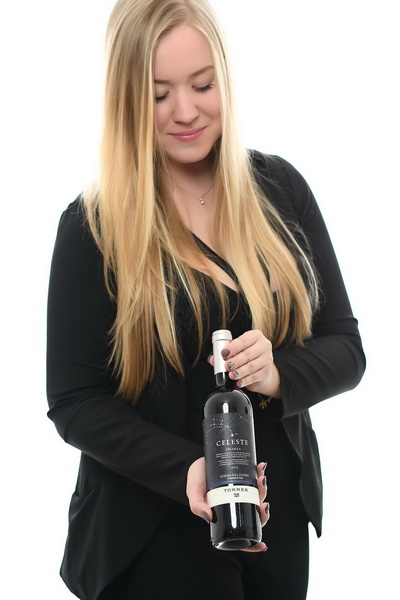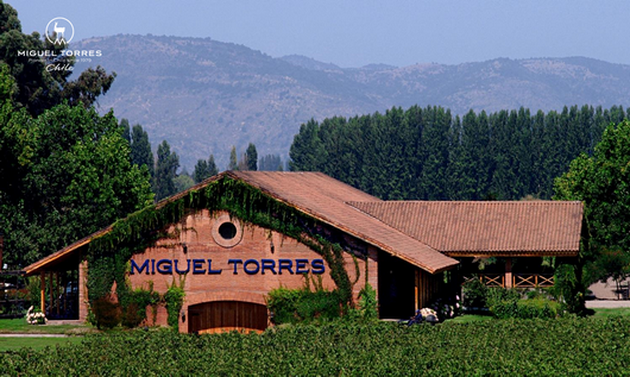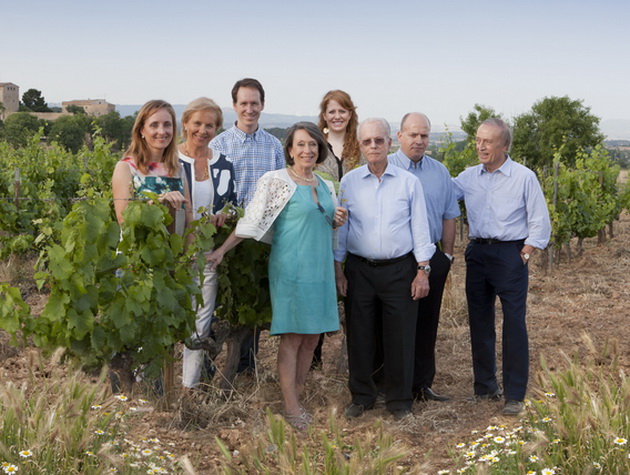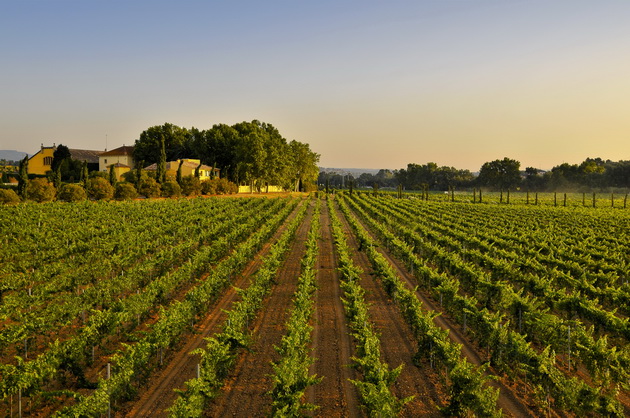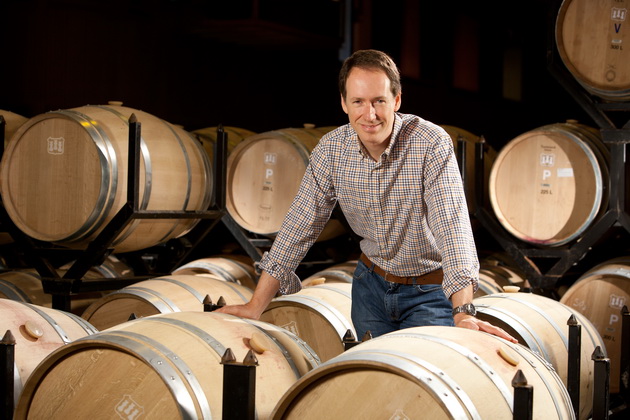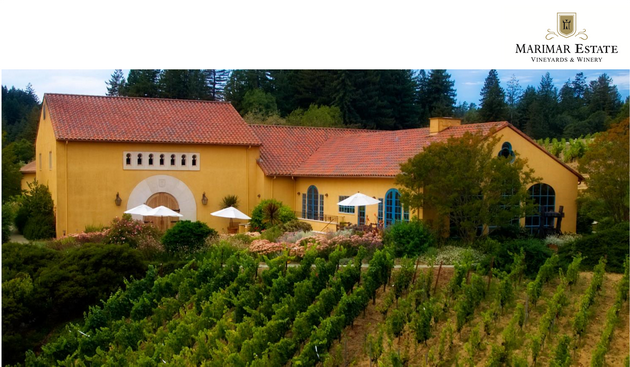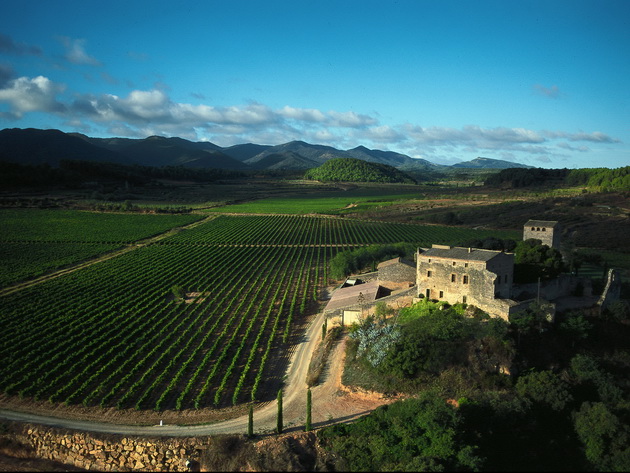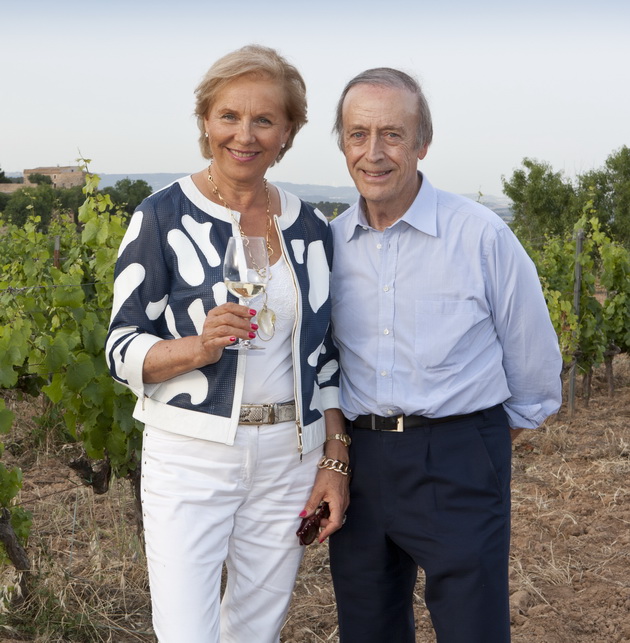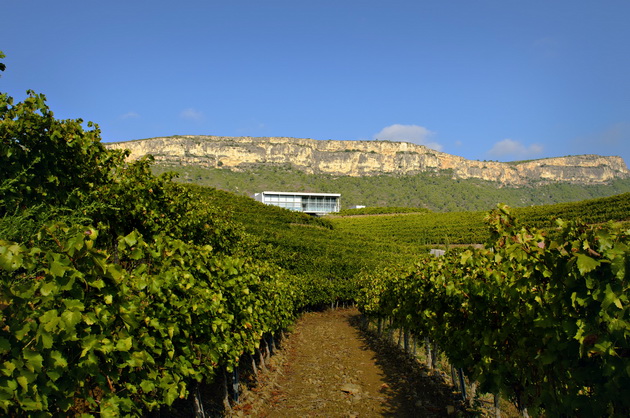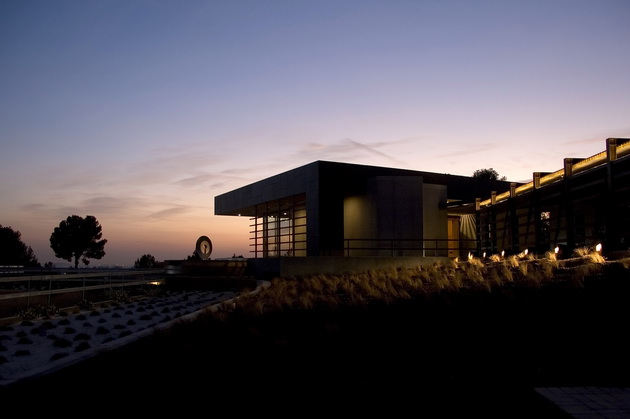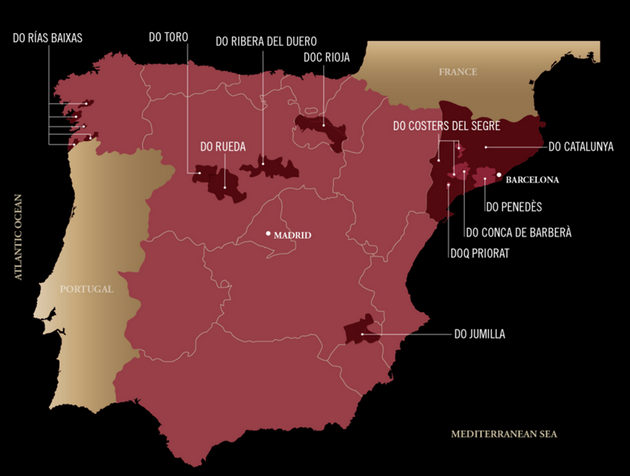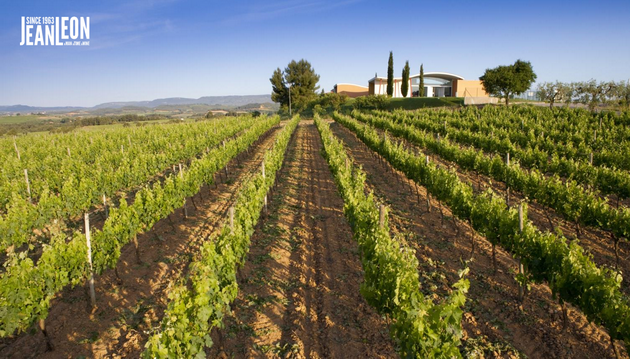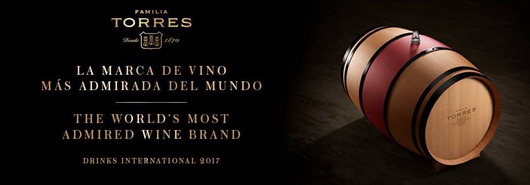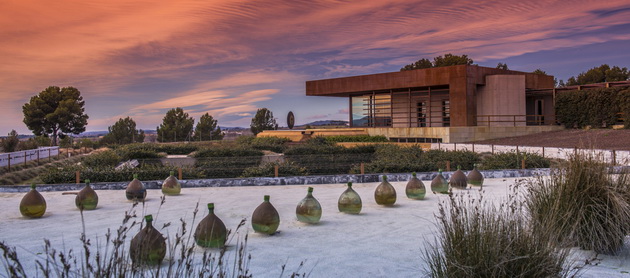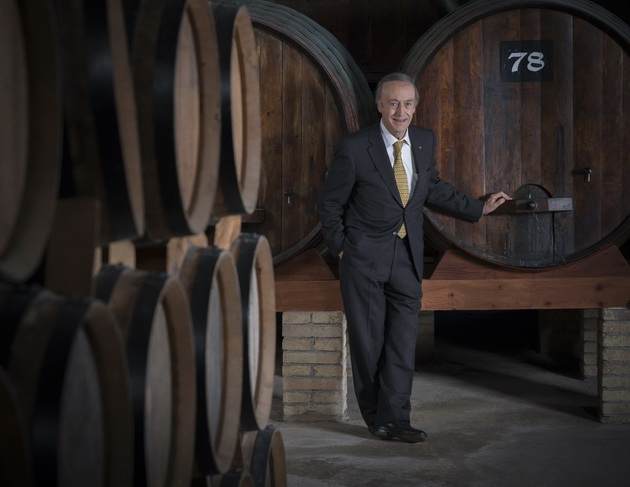What a terrific chat with Caroline Leblanc, Ambassador for Miguel Torres Wines of Spain!
Click on the arrow above to watch the video.
Listen to Caroline’s stories from the colourful winemaking history of the Torres family.
Discover what makes Spanish wines so special and how to pair them with food.
Get your Free Tempranillo Quick Guide here:
Cheers,
Natalie
P.S. Next Sunday, September 3, we’re on break for Labour Day.
Join us September 10 with Jean-Benoit Deslauriers, Winemaker at Benjamin Bridge in Nova Scotia whose wine just got selected to be served at Gordon Ramsay’s London, UK restaurant at 6 pm eastern right here:
Want to know when we go live next Sunday with Jean-Benoit?
Click on the Follow and Like buttons on this page to get notified when we go live.
We’ll be simultaneously broadcasting on Facebook Live, YouTube Live Stream and Twitter Live Video via Periscope.
Watch previous episodes of the Sunday Sipper Club (SSC) and find out who’s coming up next.
Click on the arrow above to hear Caroline’s stories from the colourful winemaking history of the Torres family.
Watch previous episodes of the Sunday Sipper Club (SSC) and find out who’s coming up next.
If you’d like to read the comments for this tasting, or make a comment yourself, visit:
https://www.facebook.com/natdecants/videos/10155383884664845/
Here’s a sampling of our lively discussion from our tasting…































Caroline Leblanc
Brand Ambassador Canada
Quebecer born in a family of wine enthusiasts, Caroline became intrigued at a very young age, about how this product from the earth had the power to connect and fascinate people.
While doing her bachelor’s degree in Marketing Communications, she worked at the SAQ, Quebec’s monopoly, where the magic happened! Receiving monthly training during almost four years, she got to know the industry which would become her passion for the years to come.
Throughout the years, her love for travel gave her the opportunity to visit wineries all over the World; between others in Portugal, Spain, France, Germany, Greece, Italy, USA, Peru and Canada. With that constantly growing and vivid interest for the wine industry, she ended up visiting the Torres winery in Pacs del Penedès in 2014: the precise moment when she knew she would one day work for the company.
She decided to pursue her studies and was selected in one of Europe’s most prestigious business school, ESADE, where she completed a Master of Science in Marketing Management. Of a year length, this Master gave her the chance to truly understand the local culture while becoming fluent in Spanish and enjoy the best Catalonia had to offer.
Graduate sommelier and WSET Level 3 candidate, Caroline is now actively representing Miguel Torres’ brands all over Canada.
Torres Sangre De Toro Garnacha 2015
Catalonia, Spain
Torres Gran Coronas Reserva Cabernet Sauvignon 2013
Penedès, Spain
Torres Vina Esmeralda 2015
Catalun, Spain
Torres Vina Esmeralda Rosé 2016
Catalun, Spain
Miguel Torres Coronas Tempranillo 2014
Catalunya, Spain
In 1928, Juan Torres Casals began distilling his wines to make brandy in the Penedès region of Spain. Eighty-four years later, Miguel Torres Maczassek took this experience to Chile, to make the winery’s first pisco.
Waltraud Maczassek & Miguel A. Torres
Our vineyard is aimed at developing the wine tourism experience through tours and an excellent restaurant awarded the title “Best regional cuisine in Chile.” We invite you to discover the tradition of Chilean winemaking under the guidance of Miguel Torres Chile.
Throughout Chile, our wineries have forged an identity and created unique products according to their climate, providing Miguel Torres Chile with varieties with the typical vinestocks and flavors of this country.
With a presence in over 100 countries, the Miguel Torres Chile family winery has established itself over the past 30 years as one of the main producers of high-quality wines, through its products’ identity, respect for the environment, and social responsibility.
The Muscat grape variety is grown in the IV Region, in the Limarí Valley, and provides the perfect flavor for El Gobernador, our reserve pisco.
A Dynasty of Wine-Growers
The roots of the Torres family in the Penedès can be traced back to the 17th century. Documents show that even in those days the ancestors of the Torres family were vintners and sold their wines on a small scale. The family tradition has been scrupulously respected down through the centuries and the company has been passed down from father to son.
Today the fourth generation of the family – President Miguel A. Torres and Vice-Presidents Juan M. Torres and Marimar Torres – are overseeing the steady transition to the fifth generation, represented by Arnau Torres – Rosselló, Mireia Torres – Maczassek, Cristina Torres and Miguel Torres – Maczassek, who most recently has taken up the role of General Manager of the company.
Right from the beginning, exports have been one of the main pillars of the company, and Torres wines can nowadays be found in more than 150 countries around the world. The other constant throughout the history of Torres has been the creation and maintenance of the image of the company as quality wine-makers, for which Torres is now famed all over the world.
This family tradition, upheld over generations, along with the work of a team of 1300 people around the world, has brought Bodegas Torres numerous Awards and recognitions. According to the magazine Drinks International, Torres is the most admired European wine brand among industry professionals, a position it has held for six years, in addition to topping the worldwide ranking in 2014, 2015 and 2017.
Our Vision
A world where we celebrate life, care for the earth and pass on our legacy. Our mission We are a team of people committed to the same goal: “From the earth to the table, we want to create extraordinary wines and spirits with the aim of bringing about memorable experiences in all corners of the world”.
Our Mission
As a family firm, we pass on our values of excellence from generation to generation, and firmly believe in social, environmental and financial sustainability, combining the tradition we have inherited with constant innovation to lead the future. The roots of Torres family can be traced back to the 17th century To be among the world’s top 10 wineries in terms of prestige and sales volume.
Our DNA
1. People, our great asset (1,300).
2. Ecology. Our big commitment to the earth for 2020: reduce CO2 emissions per bottle by 30% compared with 2008.
3. Fair trade.
4. Giving back into society. For tax purposes our Corporate headquarters are in Spain and each year our Foundation helps the world’s orphaned
children.
5. R&D&I. We continually investigate, searching for different products and higher quality, with the same demanding standards as ever.
6. Our clients. Closer to our clients in more than 150 countries: we gain greater insight into their needs and they understand Torres’s potential to compete with the most prestigious wines.
7. Close to end consumers and customers. Worldwide approach. Face-toFace: Vinotecas (Barcelona, Santiago de Chile, Shanghai) & Visitingcenters.
Social networks. Special focus gastronomy (where food & wine & consumer meet): Wine & Culinary International Forum.
8. A unique family. “The more we care for the earth the better our wine”.
Our Values – defined by an 80-person team in 2001.
Honesty: Typifying everyone in our company.
Profitability: To be competitive, the company must be profitable and must control costs.
Passion for quality: The commitment of everyone to make the best wines and brandies and to provide our clients with the best service.
Team Work: Always more productive than the sum of individual work; being flexible.
Innovation: We create ideas, innovate, believe in a knowledge culture and encourage our people to take risks to succeed.
Participation: Feeling involved in the company and its future, enjoying the work and always collaborating towards a common aim: the health and well-being of everyone, including our retirees.
Client closeness: Providing our clients with what they need and what they want from our products.
Humility: We don’t pat ourselves on the back or think we are the best; we simply believe in doing things a little better every day.
Respect for the environment: Ecology forms part of our strategy! We put in into practice because we live off the land.
Trust and loyalty: In our relationship with our superiors and our peers, and also towards the company for keeping us informed in a timely manner.
And, lastly, we have added a value that deserves special emphasis:
Agility: Speed and fast response capacity in resolving problems.
Key Dates in the History of Torres
1870 The company is founded by Jaime and Miguel Torres. The bodega is built opposite the railway station in Vilafranca.
1904 (April 17th) His Majesty King Alfonso XIII visits the bodega. Lunch was served inside a 500,000 litre wooden barrel.
1905 Death of Jaime Torres. Since he left no heirs, his companies are divided between his brothers and nephews, except the wine company, which is left to Miguel Torres.
1906 Death of Miguel Torres. His son, Juan Torres, inherits the company.
1907 On February 7th, Juan Torres Casals registers the Coronas trademark.
1909 Miguel Torres Carbó is born in the “Casa Pairal,” very near to the Vilafranca railway station. This house was the Torres family museum until 1997.
1928 The company begins the distillation and ageing of brandies.
1932 Death of Juan Torres. The company is taken over by his son Miguel Torres at the age of just 23, helped in the early stages by his mother, Doña Josefa.
1934 Miguel Torres Carbó and Margarita Riera are married.
1936 Civil War in Spain. The bodega is partially destroyed by bombing in January 1939.
1940 Rebuilding of the bodega begins. Wines are no longer sold in bulk, and the wines are sold in labelled bottles for the first time.
1942 The first bottled wine, Coronas, is launched.
1946 Torres 10 brandy is launched onto the market.
1947 The first Viña Sol is released.
1954 Sangre de Toro is put on sale for the first time.
1963 After completing his studies in Dijon (France), Miguel A. Torres, son of Miguel Torres Carbó and Margarita Riera, takes over the company’s technical management.
1966 The first of the non-traditional varieties, Cabernet Sauvignon and Chardonnay, are planted and the first stainless steel tanks come into use.
1968 The new technique of cold fermentation for white wines is introduced. Fresh fruity white wines, first Viña Sol closely followed by Viña Esmeralda, are blessed with tremendous success, replacing the concept of tired oakaged whites.
1970 The winery celebrates its centenary.
1975 Marimar Torres takes up residence in the U.S. The sales of Torres wines in this market begin to rise.
1979 Miguel Torres buys 100 hectares (247 acres) of vineyards in Chile. The Chilean wine industry’s first stainless steel tanks are imported from Spain, along with the first new oak casks in over forty years. Gran Coronas Black Label 1970 wins the Gault-Millau wine olympiad in Paris, with higher marks than wines like Chateau Latour or Château HautBrion.
1980 Marks the start of an important period of reflection on the style of red winemaking, reducing the yields of the wines and controlling the process of fermentation. Fruit tannins (from the grapes) start to be preferred to wood tannins, perfecting the ageing in oak. Work begins on reviving old Catalan varieties.
1982 Miguel Torres buys 22.5 hectares (56 acres) of vineyards in the Sonoma County region of the Russian River/Green Valley, California, close to the town of Sebastopol. Planting of Chardonnay, Pinot Noir and Parellada begins in 1986.
1983 Torres’ own distribution company opened in the Canary Islands.
1985 50 more hectares (124 acres) are bought in Chile.
1989 Milmanda scores third in a blind tasting of oak-fermented Chardonnays from around the world (the first two were both Montrachets).
1990 The Right Honourable Jordi Pujol, the President of the Generalitat de Catalunya, awards the ‘Creu de Sant Jordi’ (Cross of St. George) to Miguel Torres. In a blind tasting held by “Farr Vintners” in London, Gran Coronas Black Label (1971 vintage) once more receives higher marks than all the Grands Crus of the Médoc. 80 hectares (198 acres) more of vineyard land are acquired in Chile, (now 230 hectares/568 acres in total).
1991 Death of Miguel Torres Carbó. He is succeeded by his son, Miguel A. Torres. The first of Torres’s Californian wines is released onto the market.
1992 The Right Honourable Jordi Pujol, President of the Generalitat de Catalunya, visits the winery in Curicó (Chile). Bodegas Torres opens its Wine Center in Pacs del Penedès to share its winemaking process and family tradition with visitors.
1993 The Marimar Torres Estate winery opens in California (USA). Doña Margarita Torres is awarded the ‘President Macià’ medal by the Generalitat de Catalunya. HRH The Infanta Cristina visits bodegas Torres.
1995 Celebration of the 125th anniversary: HRH Prince Felipe visits the winery in California, HM King Juan Carlos I visits the bodegas in Pacs.
1996 The Chilean Government presents Miguel A. Torres with the Order of Bernardo O’Higgins (grado de gran oficial), in recognition of services lent towards improving relations between Chile and Spain, as well as his contribution towards the viticultural development of that country.
1997 The Miguel Torres Foundation Exhibition Hall is inaugurated at the Visitors Reception Centre in Pacs del Penedès, containing the Torres
family’s artistic and historic collection. The brandy, Torres 20, is chosen as the best brandy in the world in a blind tasting of brandies and cognacs organised by the International Wine & Spirit Competition, and awarded with a gold medal. Establishment of a Joint-Venture in China: Zhangjiakou Great Wall Torres Winery Co. Ltd. Bodegas Torres was awarded with the ISO 9002:1994 certification for its wine and brandy production and bottling processes, following extensive auditing by the officially recognised body, “Det Norske Veritas”.
1998 Torres founds its own company in Sweden: Miguel Torres Sverige AB.
1999 Miguel A. Torres took on the Presidency of the International Wine & Spirits Competition (IWSC). The Readers of the North American magazine Wine Spectator declare Torres as “The Most Important Winery in Spain”. Torres’ commercial office in China opens: Shanghai Torres Wine Trading Co. Ltd.
2000 73 hectares are acquired on the Sonoma Coast – the best Pinot Noir area in California (USA). The vineyard is named “Doña Margarita”. In april, Miguel A. Torres, Millennium Trophy by Alles Über Wein German magazine.
2001 Miguel A. Torres is given the title of “Illustrious Visitor” by the City of Santiago (Chile). Torres is the only Spanish winery mentioned in the Wine Spectator’s Hall of Fame in their 25th anniversary issue. Establishment of a Joint Venture in India – T.T & G. Trading Private Limited – the first Spanish winery to do so there. Miguel Torres becomes part of the Peruvian Company: Distribuidora de Vinos S.A.C
2002 The Right Honourable Jordi Pujol, the President of the Generalitat de Catalunya, opens Torres’ new Visitors Centre in Pacs del Penedès. Miguel A. Torres is named “Decanter Man of the Year 2002” by the international magazine Decanter.
2003 Acquisition of Fundo Empedrado estate in Chile (369 ha / 912 ac). Acquisition of 160 hectares / 395 acres of vineyards in Jumilla, Spain.
2004 Death of Doña Margarita Riera Puig widow of Torres. Acquisition of vineyards in Toro, Spain (40 ha / 99 ac) and a small winery in the Ribera del Duero area of Spain.
2005 Miguel A. Torres receives the Personality of the Year award for innovation from Wine International Magazine. Celeste launched – Torres’ first red wine made in Ribera del Duero.
2006 Miguel A. Torres distinguished with the “Lebenswerk” (lifetime) award by the German magazine Wein Gourmet. Wine Enthusiast Magazine names Torres as the Best European Winery.
2007 Miguel A. Torres most influential Spanish winegrower and second in Europe, as per 2007 Decanter worldwide Power List. Salmos red wine launched. Torres’ first D.O.C. Priorat wine. Torres purchases a land of 52.158,23m2 in Labastida (La Rioja).
2008 Presentation of the new “Bodega Waltraud” for Torres single vineyard wines. Presentation of the new cellar in the Priorat Area.
2009 Ibéricos launched – Torres’ first red wine made in Rioja.
2010 Miguel Torres Maczassek Executive President of Miguel Torres Chile. Mireia Torres Maczassek appointed Manager of Jean Leon and Torres Priorat. Miguel A. Torres awarded the Meininger Verlag Lifetime Achievement (Germany) and the Hall of Fame Livets Goda (Sweden). Also honored by the International Wine Challenge with the Lifetime Achievement Award in recognition of his professional career.
2011 Time Magazine writes a lengthy article about climate change and Bodegas Torres. Miguel A. Torres awarded by Drinks Business Green Awards with the Lifetime Achievement Award for his overall contribution to sustainability in the wine industry.
2012 Miguel A. Torres receives the Order of the Lion of Finland, the highest decoration the Finnish government can grant to a foreigner. Miguel Torres Maczassek appointed General Manager of Miguel Torres Group. Miguel A. Torres receives the “Wine Intelligence 10 for 10 Business Award” by Wine Intelligence (Research-led strategy consultancy) for “making an outstanding contribution to the wine industry in the last decade”.
2013 Miguel A. Torres receives the Wine Enthusiast Lifetime Achievement Award. Bodegas Torres is named the most well-known European Wine Brand and the 11th worldwide in The Power 100, a ranking of the wine and spirits industry produced by the British company Intangible Business. Bodegas Torres is awarded the Gold Plaque of the Order of Merit in Agriculture, Fisheries and Food by the Spanish Council of Ministers for its innovative spirit and international reach. The magazine Drinks International ranks Bodegas Torres second in its “World’s Most Admired Wine Brands” edition.
Miguel A. Torres receives the Medal of Honor for Professional Lifetime Achievement from Foment del Treball, the Catalan trade association.
2014 Bodegas Torres unveils the first electric-solar train to be used for wine tours in Europe. The train makes it possible to cut CO2 emissions by 50% compared to the emissions generated by the diesel train previously used at the company’s Wine Center in Pacs del Penedès. Bodegas Torres takes 1st position in the “World’s Most Admired Wine Brand” ranking by Drinks International. Torres is the first Spanish and European winery awarded with this distinction.
2015 Jaime I awarded world’s best brandy at the World Drinks Awards 2015. Torres named World’s Most Admired Wine Brand by Drinks International for second consecutive year.
2016 Torres named World’s Most Admired European Wine Brand by Drinks International, a position it has held for six years, in addition to topping the worldwide ranking in 2014 and 2015.
2017 Torres leads the Worl’d Most Admired Wine Brand chart by Drinks International for the third time.
Family Profiles
Miguel Torres Carbó (1909 – 1991)
Born February 3, 1909. Died May 15, 1991.
Degree in Pharmacy.
Degree from the Instituto Químico de Sarrià.
Degree from the Station Agronomique et Oenologique in Bordeaux.
In 1934, he married Margarita Riera, who since then actively collaborated in company affairs.
President of the Association of Catalan wine exporters for 21 years, re-elected biannually.
President of the Asociació Vinícola Catalana.
Member of the Spanish Federation for Industry and Foreign Trade (F.E.I.C.E.V.)
Member of the Barcelona Chamber of Commerce.
President of the Alt Penedès delegation of the Barcelona Chamber of Commerce.
Silver award from the winemakers of Barcelona.
Commander of the Order of Agricultural Merit.
Creu de Sant Jordi (Cross of Saint George).
Doña Margarita Riera (1909 – 2004)
Born June 10, 1909. Died January 13, 2004.
Margarita was the Honorary President of the Torres Family wine company and played an important part in the reconstruction and development of the winery since 1939. She participated actively with her late husband Miguel Torres Carbó, and until 1989, personally looked after the Eastern European markets of Austria, Czechoslovakia, Poland, Hungary and Yugoslavia. She regularly attended the Duty Free and SIAL trade fairs, always taking care of PR, and was omnipresent at the most important events in the Barcelona social circle. She spoke fluent English, French and German.
In June 1993, the President of the Generalitat de Catalunya (Catalan Government), the Rt. Hon. Jordi Pujol, awarded her with the ‘President Macià’ medal for contribution to industry. While her health prevailed, she continued to participate in company board meetings.
Miguel A. Torres
Born in Barcelona in 1941, Miguel A. Torres is the second son of Miguel Torres Carbó and Margarita Riera.
In 1957 he began his studies at the University of Barcelona (Chemical Sciences), and in 1959 he moved on to the University of Dijon (Burgundy), where he specialised in Oenology and Viticulture.
In 1962, he joined the family business, and currently serves as the President of the company.
In 1967 he married Waltraud Maczassek. It was decisive that his wife was German as Waltraud Maczassek initiated and directed exports to Germany, which today is one of the most important markets.
In addition to English and French, he speaks an acceptable German and has also studied Japanese and Russian for several years.
He has written several books, the most recognized being “Vineyards and Wines” which was published in 1977 and which is now in its seventh revised and updated edition, available in Spanish and English.
In 1996, he was honoured by the Chilean government with the Grand Official of the Order of Bernardo O’Higgins, in recognition of his services to improve the relations between Spain and Chile, as well as for his contribution to the wine sector development of this south American country.
In 2012 Miguel A. Torres received the Order of the Lion of Finland, the highest decoration the Finnish government can grant to a foreigner.
His concern for climate change and ecology has been recognized internationally and also the magazine Time dedicated an extensive article to him in August 2011.
In May 2013 Miguel A. Torres received the Golden Plaque of the Civil Order of the Agricultural, Fishing and Food Merit (Placa de Oro de la Orden Civil del Mérito Agrario, Pesquero y Alimentario), awarded by the Council of Ministers of Spain.
During his long career he has travelled all over the world, visiting more than 50 countries.
He has 3 children, Anna, Mireia and Miguel.
Marimar Torres
Marimar Torres has been involved in the wine business all her life.
Born in 1945 in Barcelona, Spain, she is fluent in six languages and holds a degree in business and economics from the University of Barcelona.
She is also a graduate of the Stanford Executive Program, and studied enology and viticulture for a year at the University of California at Davis.
At Marimar Estate, she directs the activities at the winery and its Don Miguel Vineyard (named after her late father) in the Sonoma Russian River Valley appellation and Doña Margarita vineyard (named after her late mother) in the Sonoma Coast appellation.
Prior to her involvement in the Sonoma operation, Marimar traveled extensively promoting Torres wines, first in Spain as the company’s export Director and later in North America, when California became her home in 1975. At that time, shipments of Torres wines to the U.S. totalled 15,000 cases; 10 years later they reached 150,000. To achieve this was not easy; especially in the beginning, Marimar was confronted with the common notion that the wine business was no place for a woman. Eventually, her tenacity and business acumen helped her overcome this bias, and she became the best-known ambassador of Spanish wines in America.
In 1986, Marimar began planting a 56-acre (22.5-hectare) vineyard in a cool microclimate ideally suited to Chardonnay and Pinot Noir. The oiginal land has been increased to the present 32 hectares (80 acres), of which 12 hectares (30 acres) are planted with Chardonnay and 20 hectares (30 acres) with Pinot Noir.
Because of her European heritage, emphasis on the vineyard is a natural concept for Marimar. The wines, made entirely from estate-grown grapes, are truly an expression of their terroir. The first release, a 1989 barrel-fermented Chardonnay, debuted in April, 1991, to great acclaim. In 1992, a 15,000-case winery was built and the estate’s first Pinot Noir was produced, which was released in September 1994.
Marimar’s dedication to the family business, however, has not come at the expense of other pursuits. An authority on Spanish cuisine, her first book, The Spanish Table: The Cuisines and Wines of Spain, was published in 1986. Her second book, The Catalan Country Kitchen: Food and Wine from the Pyrenees to the Mediterranean Seacoast of Barcelona, came out in April, 1992.
Marimar lives in Sausalito and Sebastopol with her daughter Cristina. Her interests include skiing, jogging, biking and horse-back riding.
Waltraud Maczassek de Torres
Married to Miguel A. Torres, she worked with her husband when the company first began to expand and enter the export market. She personally oversaw wine exports to Germany – her home country – for 25 years.
She is the mother of three children: Miguel and Mireia Torres Maczassek, who are both currently working in the company, and Ana Torres Maczassek, who is a plastic surgeon.
She now spends part of her time traveling with her husband, Miguel A. Torres, to meet with our clients around the world.
Waltraud Maczassek studied fine arts and education in Wiesbaden, Germany. Years later, she studied at the Sant Jordi School of Fine Arts in Barcelona where she completed her Bachelor’s Degree. She has shown her work in Barcelona, Wiesbaden, Oslo, Geneva and other cities.
She is a multidisciplinary artist who works in sculpture, photography and engraving, but her greatest passion is painting.
Nature is her main source of inspiration, and its presence is palpable throughout her work.
For Waltraud Maczassek, making art is a process of continuous development. Quite similar, in fact, to the maturing of a wine. One could say that the symbiotic relationship between the creation of her artistic body of work and the world of wine has defined the life of Waltraud Maczassek.
Her work displays Mediterranean influences, but also references her German roots.
The expressivity of her interior landscapes as well as her particular use of color has resulted in a highly individual, contemporary body of work. Some of her works can be seen in our company buildings.
Mireia Torres Maczassek
Mireia Torres Maczassek started her professional training at the prestigious Sarrià Chemical Institute in Barcelona, where she graduated in Chemical Engineering, specializing in Analysis, in 1994.
In 1995, she enrolled in the École Nationale Supérieure Agronomique de Montpellier, where she obtained a degree in oenology and viticulture.
During these further studies, she also gained further practical experience in wine production.
Mireia deepened her technical expertise and know-how at the Derypol company, a manufacturer of resins and flocculants, where she worked in Research & Development from 1997 to 1998.
In 1999, she joined the family company to head the analysis laboratory, carrying out projects related to the study of aromas in wine.
The following year, she took charge of the company’s R&D and innovation area, where she celebrated –together with the company’s highly competent team of professionals– great successes, both in terms of international publications as well as in creating new products.
In 2004, she became Head of Winemaking of the company. In this position, she was responsible for the production and management of the main winery in Vilafranca del Penedès, as well as leading the development and implementation of the projects in Ribera del Duero, Priorat, Rioja and Rueda.
Also during this time she managed the project for recovering ancestral grape varieties and lead the way to the creation of Natureo, a dealcoholized wine.
Today, Mireia Torres Maczassek is Director of the Torres Priorat and Jean Leon wineries. She also serves as the chief winemaking consultant for the Torres group including projects such Pazo das Bruxas Albariño and Vardon Kennett, the new premium sparkling wine released in October 2016.
Mireia has also dedicated much of her time to research in winemaking and viticulture. She led the consortium of 26 companies, called CENIT DEMETER, from 2008 until 2012, in order to improve understanding of the effects of climate change. The consortium resulted in 34 scientific articles, 11 doctoral theses, 25 projects of master and 1 patent.
She is a proud parent of two teenagers.
Miguel Torres Maczassek
Born in 1974, Miguel is the son of Miguel Agustín Torres and Waltraud Maczassek.
He has 2 sisters: Mireia, who is the Manager of Torres Priorat and Jean Leon, and Anna, who is a doctor. As Miguel Agustín’s children, they learned about wine and vineyards from him, and their mother passed on her creativity as a painter.
Miguel studied Business and Management at the ESADE University in Barcelona and at the Kennan Flager Business School in North Carolina, USA. He also studied oenology at the Rovira i Virgili University, in Tarragona.
He worked at several FMCG multinationals before moving into a field closer to wine, but still quite different: the perfume business.
For almost 3 years, he worked as Brand Manager for Carolina Herrera New York perfumes, a fashion brand belonging to the Antonio Puig Perfumes Company. The company, with headquarters in Barcelona, is also responsible for other internationally prestigious fragrances.
Then he joined the family business as Manager of the Jean Leon winery (part of the Torres Group since 1995) in April 2001.
During this time, he invested in improving the quality of the company’s wines as well as overseeing the construction of a visitors center dedicated to wine tourism.
In 2004, he accepted the position of Marketing Director of Miguel Torres S.A., responsible for product development, communication and new launchings, including the projects of Ribera del Duero (Celeste), Priorat (Salmos), Rioja (Altos Ibéricos) and Rueda (Verdeo).
At the end of 2009, Miguel Torres Maczassek was appointed Executive President of Miguel Torres Chile. During a period of almost 3 years, he set the future strategy of the winery by committing to sustainability, organic winegrowing and high-end wines.
While in Chile, he had to manage the crisis resulting from the 2010 earthquake. Following this event, he decided to give the winery a fair trade focus, making it one of the first privately owned wineries to do so. He obtained IMO-Fair for Life/Fair Trade certifications for the Santa Digna range and began producing Estelado, the only sparkling rosé made from the País grape.
In doing so, he contributed to a renewed appreciation of this variety, which arrived in Chile 500 years ago and has now become a symbol of Chilean winemaking.
Before returning to Spain, he resumed a project initiated by his father to plant Pinot Noir in the Empedrado Valley. Several years later, this resulted in the wine Escaleras de Empedrado, the first Chilean wine to originate from terraced vineyards rich in slate.
In 2001 he was appointed General Manager at the Jean Leon winery.
In 2004 he accepted the position of Marketing Director of Miguel Torres S.A.
In 2009 he was appointed Executive President of Miguel Torres Chile.
He is currently General Manager of the Torres Group.
20
Since September 2012, Miguel Torres Maczassek is General Manager of the Torres Group.
He speaks fluent Catalan, Spanish, English and French and a smattering of Japanese and German.
In 2002, Miguel married Sarah Andrews, and they have 3 children: Carolina, Andrea and Miguel Sebastian.
He enjoys spending time with his family, walking in the countryside or mountains, reading history books, and drawing, a passion he inherited from his mother.
Torres’ Viticultural Philosophy
1. The grapes:
Torres possesses more than 2,000 hectares (4,940 acres) of vineyards, owned or on long-term lease, which are planted largely with traditional and non-traditional grape varieties adapted to the different climates and soils of Catalonia. Grapes are also bought from local farmers who receive technical assistance from the company.
2. Planting density:
In most of our vineyards, planting density has been brought up to 4,00o vines per hectare. At this density, there is a greater colonisation of the soil by the roots and the moisture in the soil is used more efficiently. The larger number of vines also gives greater shade to the soil and at the same time reduces the loss of moisture through evaporation and increases the efficiency of the canopy. This greater density also reduces vine vigour, which improves the quality of the grapes.
3. Pruning:
Torres vines have used posts and wires to train the vines since the early sixties. Among other advantages, since 1985 this has permitted us to machine harvest our grapes if we so wish. Up until that time, the Guyot simple method of pruning was used; this has now been converted into Cordon Royat, which is more resistant to machine harvesting, as well as allowing mechanical pre-pruning. Currently there are seven harvesting machines.
4. The harvest:
White varieties are still hand-picked, as are some of the red grapes, particularly those from our single vineyard sites. The rest of the red grapes are machine harvested. The mechanisation of this task allows us to choose the perfect moment to harvest, as the length of time it takes to pick the grapes is much reduced. It also allows us to pick at night, when temperatures are much lower.
5. Single vineyards: (Vinetum Paganicus)
Torres has selected five ‘single vineyards’ (or vineyard plots) covering a total of 111 hectares (274 acres) to make five special wines. These single vineyards, with particular soils, planted with selected noble grape varieties which are subjected to a policy of low yields to raise the quality of the company’s most prestigious wines, are to be found at the following sites:
Finca / Vino Ha. Municipio D.O.
Mas La Plana 29 ha/72 acres Pacs del Penedès Penedès
Milmanda 15 ha/ 37 acres Vimbodí Conca de Barberà
Mas Borràs 10 ha/ 25 acres Santa Maria de MirallesPenedès
Fransola 25 ha/ 62 acres Santa Maria de MirallesPenedès
Grans Muralles 32 ha/ 79 acresVimbodí Conca de Barberà
Reserva Real 4 ha/ 10 acres Santa Margarida d’Agulladolç–Parcela Les Arnes (Mediona) Penedès
6. Viticultural philosophy
New trends in viticulture
Returning to the viticulture of our ancestors, i.e. quality viticulture versus modern intensive viticulture with large yields.
Completely avoiding the use of chemical treatments, replacing them with biological alternatives.
Improving the leaf canopy, making it less compact, higher and homogeneous to obtain better exposure to sunlight.
Mechanising labour with the aim of reducing costs.
Single Vinyards Soils
Mas La Plana
The soils of the Mas La Plana Single Vineyard are developed over an area of 29 hectares on recent, poorly consolidated, fine detrital materials. It has a very deep soil with basic pH, moderate water retention capacity and medium active lime content. Made up of gravel (limestone, dolostone) and alluvial limestone from the Miocene age. Its geological position favours deep soils, characterised by average or moderately fine textures that are rich in carbonates. In some areas, soils are found to be developed on superimposed layers of gravel of fluvial origin, forming high Terraces. Historically, the action of man in this area has been particularly intense.
The current climate, typically Mediterranean, with hot summers and cool winters, and the peculiar characteristics of the soil promoted the growing of vines, a tradition here for generations. The 29 hectares that make up the Single Vineyard meet ideal conditions for obtaining a quality harvest: deep soils with a porous structure and low contents in organic material, and local gentle relief that avoids run-off and the loss of materials and productivity. These quaternary alluvial terrains produce red wines from Cabernet Sauvignon and Merlot, with great aromatic intensity and sweet tannins.
Mas Borràs
The Mas Borrás Single Vineyard is located in the Catalan Pre-Coastal Mountain Range, made up of a Palaeozoic base with a more or less folded Mesozoic and Cenozoic covering. Very deep soil with basic pH, high water retention capacity and moderately high active lime content. Made up of shale with layers of intercalated gypsum from the lower Eocene. Between 1985-1986, this land was chosen by Jacques Bernier, an expert in growing Pinot Noir from Burgundy. On the estate, the lands predominantly have sedimentary tertiary materials with fine textures such as red loams or lutites, which are complemented by levels of limestone and dolomite. This sedimentary origin favoured the precipitation of sulphates, conditioning the presence of gypsum intercalated between the layers of lutites.
A selection of 10 hectares of this land makes up the Mas Borrás Single Vineyard. This portion of land is characterised by an intense red colour, fine textures, a low degree of stoniness and the presence of gypsum in the profile together with a high degree of carbonation. The physical-chemical interactions that take place in these soils provide a very specific typicity. The climate is Mediterranean, but conditioned by the local relief, which confers a certain continentality upon the area. This is the best location in the district for producing Pinot Noir varieties.
Milmanda
Located in the River Ebro depression, a tertiary basin filled with sediment material from the Palaeogene and Miocene eras. Deep soil with basic pH, very high water retention capacity and very high active lime content. Made up of reddish marl from the upper Oligocene. To the north, it borders the Serra de Prades mountains and the area of Poblet via the Sillerets ravine, which sees seasonal activity. In the area where the estate neets the ravine, there are low terraces with recent alluvial soils, characterised by profiles formed by allochthonous pebbles of varying sizes deposited in parallel layers and of a diverse nature: limestone, metamorphic, granite, etc., which come from more or less distant areas. At the highest position, there are high terraces and remains of older piedmont deposits, normally made up of metamorphic rocks, which are abundant in this sector of the Serra de Prades.
Outside of this quaternary context, the main part of the estate lies on carbonated materials from the Oligocene, with distinctive reddish loams and some specific areas of conglomerates. The easily alterable loams favour carbonate soils with few stones, fine textures and of an average depth according to the slope and intensity of the predominant erosive processes.
In the areas of conglomerates, the stoniness increases and the pebbles favour the infiltration of water. The Milmanda Single Vineyard was selected in an area of 15 hectares where reddish soils predominate in a microclimate of Mediterranean characteristics with a continental tendency. Under these conditions, the Chardonnay vegetation is very balanced and gives wines of varietal character that are very suitable for oak-ageing.
Grans Muralles
The soil of the Les Muralles Single Vineyard has formed with modern materials from the Serra de Prades mountains, mainly angular slate debris flows. The thickness of this layer varies according to its location in the estate and in the subsurface layers, there are altered materials from the Eocene in an area that is less accessible for the roots. These soils are neutral and lacking in carbonates, therefore the problems of chlorosis so commonly found in strongly limey soils are not detected here. It has a deep stony soil with basic pH, low water retention capacity and negligible active lime content. Made up of layers of slate gravel and Palaeozoic granite. Moreover, content with sufficiently high mineral nutrient levels and moderate levels of organic material ensure good mineral nutrition for the vines.
From the structural viewpoint, a thick clay structure and content abundant in stones allow powerful root development, considerable drainage and sufficient water retention to supply the vines’ needs. These special soil characteristics,
together with a climate that is Mediterranean but deprived of the maritime influence, allows wines of unquestionable quality to be obtained. This great viticulture potential is maximised on an agronomic level by selecting those plots that confer least vigour upon the vine and that, in turn, favour progressive and perfect ripening. The result of this process is the obtaining of 32 carefully selected hectares on very mineral, stony terrain, ideal for producing very specific Single Vineyard wines of fine quality and concentration.
Reserva Real
Shallow stony soil with basic pH, moderate water retention capacity and negligible active lime content. Developed from Silurian slate, unique throughout the Penedès region. Tertiary and quaternary materials predominate in this area, but a small portion of terrain exists that developed on a geological substratum of Palaeozoic origin. The soil of the Reserva Real Single Vineyard rests on these ancient materials that are unique in the entire region. Siluric and carboniferous slates and quartzite constitute the basic materials of the 4 hectares of soil that form this plot. The slates are folded by the Alpine orogenesis, forming folds of variable schistosity. On a subsurface level, these materials have undergone a considerable process of chemical alteration, which has conditioned the characteristics of the resulting layers of soil. The moderately clayey textures combine with abundant stoniness of angular slate gravel and quartzite pebbles.
Our Added Value
Miguel Torres, a family-owned company with more than 130 years of history, has at the same time adapted to changes in modern winemaking. The Torres winery, in Pacs del Penedès, four kilometres from Vilafranca, is among the most advanced in Europe.
In our opinion, key factors in the production of quality wines are the following:
1. Our people
Torres has an excellent technical team: oenologists (trained in California, Bordeaux, Dijon, Montpellier and Tarragona), a research department working with different universities around the world, a microbiology team up to date with current research technology, a team of chemists that runs an advanced analytical laboratory, an engineering group, and a professional cellar team. This group totals more than 100 people.
2. Viticulture
We can guarantee the quality of our wines because more than 25% of the grapes used are produced in our own vineyards located throughout Catalonia. Today, we have 1,700 hectares and still intend to acquire more. The diversity of climates and soils allows us to choose the best location for each grape variety. On the other hand, we have an ambitious research program in viticulture to increase vineyard potential. We also focus our research on soil profiling and in-vitro techniques, among others.
In addition to all of this, we are working on the recovery of several old Catalan grape varieties.
3. Enology
When it comes to technology, Bodegas Torres is a cutting-edge company. Following rigorous research and countless experiments, we apply the innovations that help us improve the quality of our wines during each harvest.
4. Research
We are currently working in different lines of research, investing around 1 million euros per year. Our achievements had been published in several research papers.
The most recent ones are:
Application of an electronic tongue towards the analysis of brandies. Authors: X. Cetó, M. Llobet, J. Marco y M. del Valle. Anal. Methods,
2013,5,1120
Winery wastewater treatment for water reuse purpose: Conventional activated sludge versus membrane bioreactor (MBR). A comparative case study). Authors: C. Valderrama, G. Ribera, N. Bahí, M. Rovira, T. Gimenez, R, Nomen, S. Lluch, M. Yuste, X. Martínez-Lladó. Desalination 306 1-7. 2012
Antimicrobial phenolic extracts able to inhibit lactic acid bacteria growth and wine malolactic fermentation. Authors: Almudena García-Ruíz, Carolina Cueva, Eva M. Gonzálea-Rompinelli, Maria Yuste, Mireia Torres, Pedro J. Martín-Álvarez, Begoña Bartolomé, M.Victoria Moreno-Arribas. Food Control 28 212-219. 2012
Supercritical CO2 extraction applied toward the production of a functional beverage from Wine. Authors: Guillermo Reglero, Mercè Mercader, María Yuste et al. The Journal of Supercritical Fluids 61. 2012
How soil forming processes determine soilbased viticultural zoning. Authors: J.M. Ubalde, X. Sort, R. M. Poch. Journal of Soil Science and Plant Nutrition, 11, nº1; 100-126 (ISSN: 0718-9508). 2011
Differential effects of polyphenols and alcohol in red wine on the expression of adhesion molecules and inflammatory cytokines related to atherosclerosis: a randomized clinical trial. Authors: Ramón Estruch, Cristina Andrés Lacueva, Rosa Mª Lamuela Ravéntós et al. Artículo aceptado por la revista American Journal of Clinical Nutrition 2011
β-Glucanases as a tool for the control of wine spoilage yeasts. Authors: M. Enrique, A. Ibáñez, J.F. Marcos, M. Yuste, M. Martínez, S. Vallés, P. Manzanares, Journal of Food Microbiology and Safety, 2010, Vol. 75(1), M41-M45
Selectivity and antimicrobial action of bovine lactoferrin derived peptides against wine lactic acid bacteria. Authors: M. Enrique, P. Manzanares, M. Yuste, M. Martínez, S. Vallés, J. F. Marcos. Journal of Food Microbiology, 2009, Vol. 26(3), 340-46
5. Producing wine in different countries
The Torres family is currently making wine in three different countries (Spain, the United States and Chile) in both hemispheres. This fact gives us the possibility to experience two harvests a year and allows our winemakers to obtain different perspectives.
Miguel Torres Chile
Sociedad Vinícola Miguel Torres S.A.
Dirección: Panamericana Sur, km. 195
Curicó, Chile
Tel: +56 75 56 41 00
Fax: +56 75 56 41 15
E-mail: [email protected]
Website: www.migueltorres.cl
General Manager: Jaime Valderrama
Employees: 163 people
The 95 hectares of vineyards and the winery of the Ahrex family, founded in 1904, were bought in 1979 by Miguel Torres, who was attracted by the dpecial climatic conditions of this region of Chile. To the winery he brought his family’s long tradition of winemaking and the more than 100 years of history as a company.
The Chilean Central Valley is free of some of the most widespread plagues and viruses that affect the rest of the world’s vines, and also has an ideal climate for top quality grape-growing. This region is dominated by the presence of the Andes, its peaks crowned with permanent snow.
The winery contains temperature-controlled stainless steel fermentation tanks. Indeed, Torres was the first company in Chile to use these tanks. Ageing is carried out in small oak casks, including a proportion of new French oak, as well as the American oak more typical of the Spanish operation.
Over the years, the company has acquired new lands and expanded its facilities and product range. The company currently has about 400 hectares of vines planted on several estates, which vary significantly in their climatic characteristics. In keeping with the winery’s spirit, all Miguel Torres Chile vineyards are certified organic.
In late 2009, Miguel Torres Maczassek, member of the family’s fifth generation, was named Executive President of Miguel Torres Chile and moved to the South American country with his family. He spent almost three years in Chile during which he obtained IMO-Fair for Life/Fair Trade certifications for the Santa Digna range.
Miguel Torres Chile makes different wines from the varieties Sauvignon Blanc, Cabernet Sauvignon, Chardonnay, Pinot Noir, Riesling, Gewürztraminer, Merlot, Carignan, Carmenère, Syrah and Monastrell in addition to sparkling wines from the País variety (Estelado) and Pinot Noir (Cordillera Brut). All of the wines undergo fermentation in temperature-controlled stainless steel tanks. They are then barrel-aged in French oak in the winery’s cellar.
Marimar Estate
Dirección: 11400 Graton Road
Sebastopol, California 95472 – USA
Tel: +1 (707) 823-4365
Fax: +1 (707) 823-4496
E-Mail: [email protected]
Website: www.marimarestate.com
Nestled in the rolling hills of western Sonoma County, the Russian River/Green Valley appellation is a perfect microclimate for growing Chardonnay and Pinot Noir. Only 16 kilometres (10 miles) from the Pacific Ocean and 80 kilometres (50 miles) north of San Francisco, the site is influenced by the ocean’s cooling breezes and drifting fog. That is why Marimar Torres selected this ideal location to export the Torres family legacy of fine wines to California.
Marimar moved to California in 1975 and began planting the vineyard in 1986. Currently the 12 ha vineyard is planted to chardonnay and the 20 ha vineyard to pinot noir. Built in 1992 with a capacity of 15,000 cases, the winery sits on a hill surrounded by vines. The production wing is outfitted with carefully selected equipment, to allow the control essential to produce a wine based on minimal handling. Its three barrel rooms with independent temperature and humidity controls provide flexibility to experiment with various vinification techniques to best express the fruit’s character.
After experimenting for four years, in 2003 Marimar Estate was converted to organic farming methods. Marimar Torres believes conversion to organic farming practices is better for the life of the vineyard in the long term. “The whole idea is to create an ideal balance between the vines and nature. The vineyard will be ecologically healthier, and the grapes of higher quality. That’s our long-term reward”, says winery founder Marimar Torres.
“Don Miguel” Vineyard
Location: Graton Rd, between Graton and Occidental (80 km/50 miles north of San Francisco)
Altitude: 61-122 metres (200-400 feet)
Total vineyard area: 33 ha. (81 acres)
Area planted: 24 ha
Rootstock: 24ha/60ac. of which 12ha/30ac. is Chardonnay and 12ha/30ac. Pinot Noir
Planting density: 5,000 vines per hectare (2,000 per acre)
Rootstock: 5C and 3309 (Chardonnay), 3309 and 101-14 (Pinot Noir)
“Doña Margarita” Vineyard
Location: Freestone Valley, Sonoma Coast (11 km / 7 miles from the Pacific Ocean)
Altitude: 135-190 metres (443 – 623 feet)
Total vineyard area: 72 ha. (180 acres)
Total area plantable: 24 h (59 acres)
Area planted: 8ha/20ac. Pinot Noir
Planting density: 5,700 vines per hectare (2,280 per acre)
Production/Economic Data
Release date of 1st Chardonnay: ‘Chardonnay 1989’ in April 1991
Release date of 1st Pinot Noir: ‘Pinot Noir 1992’ in September 1994
Investment: $5 million ($2 million-vineyard, $2million-winery, $1 million – reception wing)
Production capacity: 15,000 9L cases
Born in Barcelona in 1941, Miguel A. Torres is the second son of Miguel Torres Carbó and Margarita Riera.
In 1957 he began his studies at the University of Barcelona (Chemical Sciences), and in 1959 he moved on to the University of Dijon (Burgundy), where he specialised in Oenology and Viticulture.
In 1962, he joined the family business, and currently serves as the President of the company.
In 1967 he married Waltraud Maczassek. It was decisive that his wife was German as Waltraud Maczassek initiated and directed exports to Germany, which today is one of the most important markets.
In addition to English and French, he speaks an acceptable German and has also studied Japanese, Chinese and Russian for several years.
He has written several books, the most recognized being “Vineyards and Wines” which was published in 1977 and which is now in its seventh revised and updated edition, available in Spanish and English.
In 1996, he was honoured by the Chilean government with the Grand Official of the Order of Bernardo O’Higgins, in recognition of his services to improve the relations between Spain and Chile, as well as for his contribution to the wine sector development of this south American country.
In 2012 Miguel A. Torres received the Order of the Lion of Finland, the highest decoration the Finnish government can grant to a foreigner.
His concern for climate change and ecology has been recognized internationally and also the magazine Time dedicated an extensive article to him in August 2011.
In May 2013 Miguel A. Torres received the Golden Plaque of the Civil Order of the Agricultural, Fishing and Food Merit (Placa de Oro de la Orden Civil del Mérito Agrario, Pesquero y Alimentario), awarded by the Council of Ministers of Spain.
During his long career he has travelled all over the world, visiting more than 50 countries. He has 3 children, Anna, Mireia and Miguel.



